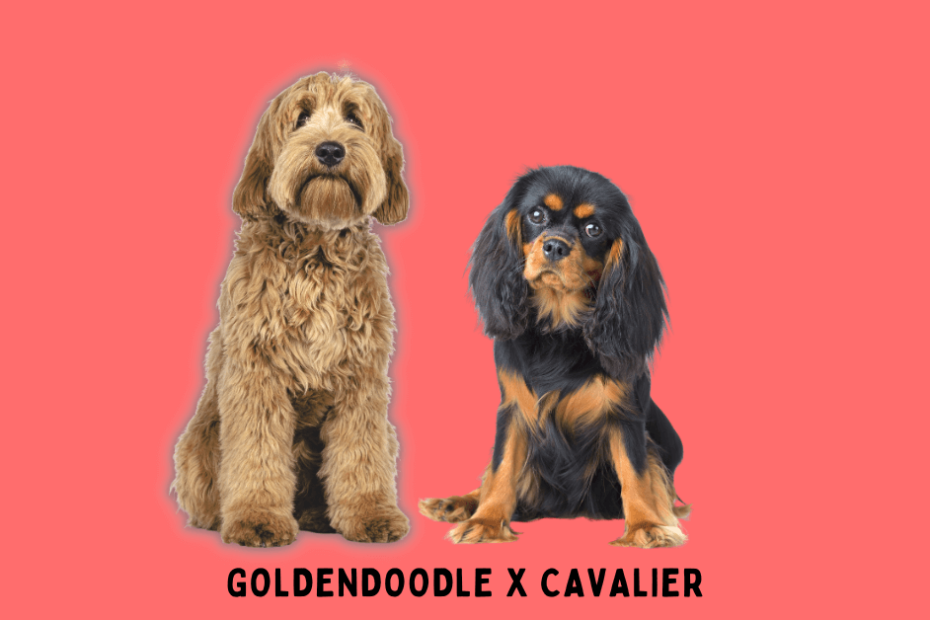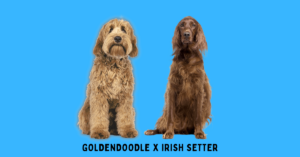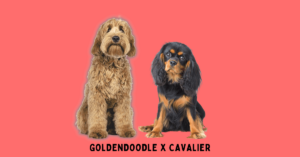Imagine the ultimate fluffball – a perfect blend of the gentle Goldendoodle and the regal Cavalier King Charles Spaniel.
Does this mix have the Goldendoodle’s friendly demeanor or the Cavalier’s royal grace? Or perhaps, a surprising mix of both?
Let’s unravel the mystery of this new designer breed, exploring the unique traits that might just make the Golden Cavapoo your next dream dog.
Breed Summary
The Goldendoodle-Cavalier mix is a hybrid breed that combines the playful and affectionate nature of the Cavalier King Charles Spaniel with the intelligence and low-shedding coat of the Poodle.
These dogs are highly sought after for their friendly and outgoing personalities and hypoallergenic qualities.
Golden Cavapoos are typically small to medium-sized dogs, weighing between 10 and 20 pounds and standing 9 to 14 inches tall at the shoulder.
They have soft, curly coats in various colors, including apricot, cream, black, and tan.
These dogs are known for their intelligence, making them easy to train and quick learners.
They are also highly social and love spending time with their families, making them great pets for households with children or other pets.
Golden Cavapoos require regular exercise to keep them healthy and happy, but they do not need as much activity as other breeds.
They are adaptable dogs that can thrive in urban and rural environments as long as they receive enough attention and exercise.
Histories of the Parent Breeds
Both breeds have a rich history and have contributed to the development of many other breeds.
Goldendoodle
The Goldendoodle, a cross between a Golden Retriever and a Poodle, gained popularity in the 1990s.
This hybrid was bred for its hypoallergenic coat and combines the intelligence and low shedding of the Poodle with the friendly nature of the Golden Retriever.
While not recognized by major canine organizations as a distinct breed, Goldendoodles are cherished for their affectionate nature and adaptability to various family settings.
Cavalier King Charles Spaniel
The Cavalier King Charles Spaniel, on the other hand, has a much longer history.
They were initially bred in England during the 16th century as companion dogs for royalty.
The breed was named after King Charles II, who was a big fan of the breed.
The breed was nearly extinct by the early 20th century, but a group of breed enthusiasts worked to revive it, and they were recognized by the British Kennel Club in 1945.
Both breeds have distinct characteristics that make them great family pets.
Goldendoodles are known for their loyalty and intelligence, while the Cavalier King Charles Spaniel is known for their affectionate and gentle nature.
Combining these traits in the Goldendoodle-Cavalier mix makes them an excellent choice for families with children and other pets.
Coat
The Goldendoodle-Cavalier mix inherits its coat type from both breeds.
Goldendoodles have a wavy or curly coat, while Cavalier King Charles Spaniels have a silky, smooth coat.
As a result, the Goldendoodle-Cavalier mix may have a wavy, curly, or silky coat.
The coat of the Goldendoodle-Cavalier mix can vary in length, depending on the traits inherited from its parents.
It may be short, like the Cavalier King Charles Spaniel, or long, like the Goldendoodle.
The coat may also be a combination of both.
Regular grooming is necessary for the Goldendoodle-Cavalier mix.
Brushing the coat regularly helps prevent matting and tangling.
Bathing should be done as needed to keep the coat clean and healthy.
Use a dog shampoo that is gentle and safe for the dog’s skin.
It is important to note that the Goldendoodle-Cavalier mix may shed, depending on the coat type inherited from its parents.
If the dog has a wavy or curly coat, it may shed less than a silky coat.
However, shedding may still occur, and regular brushing can help minimize shedding.
Coat Colors
One of the most exciting things about Goldendoodle-Cavalier mixes is their unique coat colors.
These dogs can inherit various coat colors from their parent breeds, resulting in many possibilities.
Goldendoodles typically have coats in various shades, including cream, gold, red, and chocolate.
Conversely, Cavaliers are known for their beautiful coat colors, which range from solid black to ruby red.
When these two breeds are combined, the resulting puppies can have solid or multi-colored coats with various patterns and markings.
Some of the most common coat colors for Goldendoodle-Cavalier mixes include:
- Cream
- Gold
- Red
- Chocolate
- Black
- Sable
- Tri-color
- Parti-color
It’s important to note that a Goldendoodle-Cavalier mix’s exact coat color and pattern can vary depending on the individual dog’s genetics.
Some puppies may inherit more traits from one parent breed than the other, resulting in a unique and one-of-a-kind coat color.
Coat Patterns
Goldendoodle-Cavalier mixes can inherit a variety of coat patterns from their parent breeds.
The most common coat types include wavy, curly, and straight coats.
Some Goldendoodle-Cavalier mixes may have a coat that combines these types.
The coat colors of a Goldendoodle-Cavalier mix can also vary widely.
They may have a solid color coat or a coat with multiple colors.
Standard colors include cream, gold, red, chocolate, black, and white.
It is important to note that Goldendoodle-Cavalier mixes may also inherit the merle gene from their parent breeds.
This gene can result in a unique and striking coat pattern characterized by irregular blotches of fur set on a lighter background.
However, it is essential to note that breeding two merle dogs together can result in health issues for the offspring, so responsible breeding practices should always be followed.
Size
Height
Regarding the Goldendoodle-Cavalier mix, their height can vary depending on their parents’ size.
Goldendoodles are typically medium to large-sized dogs, while Cavalier King Charles Spaniels are small to medium-sized dogs.
Therefore, the Goldendoodle-Cavalier mix can range from minor to medium-sized dogs.
On average, the height of a Goldendoodle-Cavalier mix can range from 12 to 24 inches (30 to 60 cm) at the shoulder.
However, it is essential to note that some Goldendoodle-Cavalier mixes can be smaller or larger than this range.
To get a better idea of the possible height of a Goldendoodle-Cavalier mix, it is best to look at the height of their parents.
A Goldendoodle’s height can range from 13 to 24 inches (33 to 61 cm), while a Cavalier King Charles Spaniel’s height can range from 12 to 13 inches (30 to 33 cm).
Weight
Goldendoodle-Cavalier mixes can vary in weight depending on their size and genetics.
Generally, Goldendoodle-Cavalier mixes weigh between 15 to 35 pounds.
However, it is essential to note that some Goldendoodle-Cavalier mixes may be smaller or larger than this range.
To ensure that your Goldendoodle-Cavalier mix is at a healthy weight, it is recommended to consult with a veterinarian.
The veterinarian can guide your dog’s appropriate weight range based on their breed, age, and overall health.
To maintain a healthy weight, providing your Goldendoodle-Cavalier mix with a balanced diet and regular exercise is essential.
Feeding your dog a high-quality diet appropriate for their size and age can help prevent obesity and other health issues.
Additionally, providing your dog with regular exercise, such as daily walks or playtime, can help keep them at a healthy weight.
It is important to note that the amount of exercise your dog needs may vary based on their age, size, and overall health.
Maintaining a healthy weight is essential for your Goldendoodle-Cavalier mix’s overall health and well-being.
By providing them with a balanced diet and regular exercise, you can help ensure that they stay healthy and happy.
Traits & Characteristics

Temperament
The Goldendoodle-Cavalier mix is known for its friendly, loving, and affectionate nature.
As a hybrid of two breeds known for their gentle and sweet personalities, it’s no surprise that this mix is a great family pet.
These dogs are highly social and thrive on human interaction.
They love to be around people and are great with children, making them an excellent choice for families with kids.
They are also known to get along well with other pets, including cats and other dogs.
Goldendoodle-Cavalier mixes are intelligent and easy to train.
They are eager to please their owners and respond well to positive reinforcement training methods.
They are also known for their playful and energetic personalities, making them an excellent choice for families who enjoy outdoor activities.
While these dogs are generally friendly and outgoing, they can be shy around new people or in unfamiliar situations.
Early socialization and exposure to different people, places, and experiences can help prevent shyness or anxiety.
Health Issues
Goldendoodle-Cavalier mixes are generally healthy dogs with a life expectancy of 10 to 15 years.
However, like all breeds, they are prone to specific health issues.
Here are some of the common health problems that may affect Goldendoodle-Cavalier mixes:
Hip Dysplasia
Hip dysplasia is a common problem in many dog breeds, including Goldendoodles and Cavaliers.
It is a genetic condition that affects the hip joint and can cause pain and discomfort.
Goldendoodle-Cavalier mixes may inherit this condition from their parent breeds.
Ear Infections
Goldendoodle-Cavalier mixes have long, floppy ears that trap moisture and debris.
This can lead to ear infections, which can be painful and uncomfortable for your dog.
It is important to clean your dog’s ears regularly and keep them dry to prevent infections.
Allergies
Goldendoodle-Cavalier mixes may be prone to allergies, which can cause skin irritation, itching, and other symptoms.
Common allergens include pollen, dust, and certain foods.
If your dog shows signs of allergies, such as excessive scratching or licking, consult your veterinarian for treatment options.
Dental Problems
Like all dogs, Goldendoodle-Cavalier mixes are prone to dental problems such as tartar buildup, gum disease, and tooth decay.
Regular dental care, including brushing your dog’s teeth and providing dental chews, can help prevent these issues.
Obesity
Goldendoodle-Cavalier mixes risk becoming overweight or obese, especially if they do not exercise enough or are overfed.
Obesity can lead to a range of health problems, including joint pain, diabetes, and heart disease.
Regular veterinary checkups, a healthy diet, and plenty of exercise can help keep your dog happy and healthy for years to come.





